#ocean surface temperature
Text
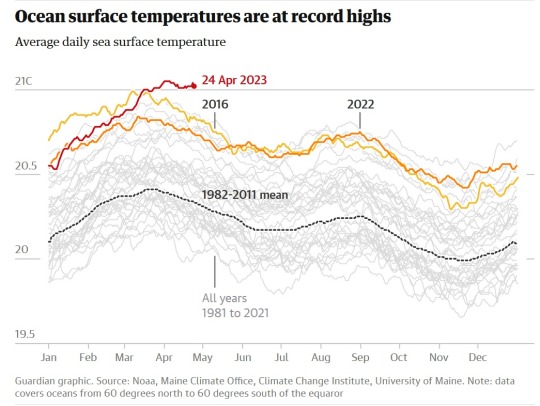
Read the article.
127 notes
·
View notes
Text

What Temperature Kills Grass Seed: A Guide for Gardeners. In this article, we will explain everything you need to know about what temperature kills grass seed. We will also provide a few tips on protecting your grass seed from the heat.
For more information, click on link
0 notes
Text
0 notes
Text
Florida ocean waters top 100

View On WordPress
#climate#climate change#florida#global warming#gulf of mexico#meme#memes#news#ocean#sea#summer#surface temperature#temperature#water
32 notes
·
View notes
Text


The North Atlantic sea surface temperature is now up to an unbelievable 4.34 standard deviations above the recent 1991-2020 baseline climatology. Relative to that, the current anomaly is a 1-in-142,000-year event!
Brian McNoldy @BMcNoldy Senior Research Associate at the Univ. of Miami Rosenstiel School. Hurricanes, climatology, & sea level rise... mostly.
#Brian McNoldy#Atlantic Sea Surface Temperatures#1 in 142000 year event#climate change#climate crisis#rising ocean levels
4 notes
·
View notes
Text
an end of the world that presents itself at first through unexpectedly pleasant weather is perhaps, in the end, the closest thing we will get to the antichrist
#t shirt weather!!!#i saw a chart of ocean surfaces temperatures and it looked like a man burning alive
3 notes
·
View notes
Text
Parts of the Mediterranean Sea and the northeastern Atlantic Ocean saw their warmest annual average SST on record.
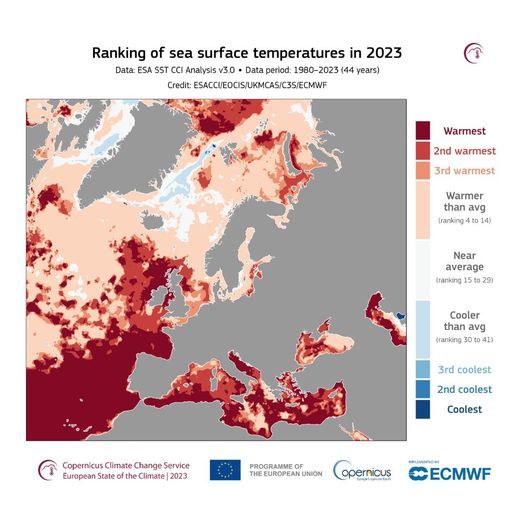
The European State of the Climate (ESOTC) report reveals that in 2023, the average sea surface temperature (SST) for the European ocean was the warmest on record.
#copernicus#state of the climate#European State of the Climate (ESOTC)#sea surface temperatures#mediterranean#northeastern Atlantic Ocean
0 notes
Text
Sea Cryptic! Danny AU- Pt.1
[Pt.2] [Pt.3] [Pt.4] [Pt.5][Pt.6][Pt.7]
As someone who lived in the middle of nowhere, Amity, the ocean both terrified and enthralled Danny Fenton.
The first time his parents took him to the beach, it was the middle of the day and he’d been stuck in the prototype GAV for hours upon hours on their “quick, ghost rumor hunting field trip.”
It wasn’t quick, and they caught exactly zero ghosts. When Danny saw the expanse of sand underneath the summer sun, he and Jazz both bounded out of the van like feral little monkeys. Danny and Jazz sprinted down the sand, their parents ambling behind them with their arms loaded up with towels, a first aid kit, and an ungodly amount of mildly ecto contaminated food that they already fought before getting onto the beach.
Danny had splashed into the water, yelped at the freezing temperature, and then promptly found a shell to keep. His mom taught him how to swim with the waves, having come from Surf City herself, and his dad taught Jazz how to dive.
It was a day full of fond memories, especially the memory of the Great War of Sand-Castle Crushing he and Jazz waged against each other.
They stuck around for the sunset, the ripples of colors and peacefulness that swept across the vast waters caught Danny in its hold.
He hadn’t forgotten that moment. Not even when he died.
After a particularly hard day as Phantom, Danny would fly to the coast and loose hours just sitting on the sand and watching the waves lap against the shore. And when those nights were clear? It felt like a slice of his own personal heaven, with the stars shining on his shoulders and the encompassing crash of the waves sheltering his heart.
And on some days, when being Danny left him frustrated, Danny would fly out to the coast and use his intangibility to walk beneath the waves. Near the coast, it’s cloudy with swirls of moving sand and disturbed waters. He walked, and walked, and floated and floated beneath the waters, taking contentment from the way the moonlight of his stars filtered through the water. He admired the way light would glint on the scales of fish and crustaceans alike as he floated beneath the surface. On those days, Danny would pick up trash and polluted things and bring them to shore, to place in the trash cans and all of the recycling cans. He picked up shells and decorated the beaches he frequented, because if it were decorated, perhaps people would refrain from chucking their waste into the sea.
Well, usually, it’d be trash.
Danny watched speechlessly, jaw cracked open just a smidge, as an explosion happened right over his head. The distortion of the water did not hide the fact that there were large chunks of plane pelting down at him, a different figure flying away from the explosion. Danny went invisible and intangible as large metal pieces plunged into his current water space.
“Gosh, people these days,” he huffed. “This is gonna take forever to…”
Danny trailed off, seeing a humanoid shape crash into the water, clearly unconscious. Danny didn’t hesitate before shooting towards the drowning person, glowing green and fully visible again. The stranger’s eyes- holy shit, that’s Batman- turned towards him before closing behind cracked open lenses. Batman slumped falling unconscious. That’s not good.
Danny rocketed out of the water with the vigilante in his arms. If it weren’t for his supernatural strength, there’s no way lanky teenage Danny would have been able to carry Batman’s grown ass built like a tank self to the shore. Likewise, if it weren’t for his strength, Danny wouldn’t have been able to start chest compressions through the layers of armor.
Danny leaned back with a sigh as Batman coughed out only a bit of water, because Danny hadn’t taken all that long to get to him, and held up his hands in a “I don’t have weapons” way as Batman whirled to him.
“Hi. Are you alright?” Danny asked, ectoplasm and instinctive ghost speak fuzzing his words a bit. Damn, Batman must have nearly died a lot. He’ll freak out about meeting Batman later.
“You saved me,” an awkward pause. “Thank you.”
“You’re welcome. The other guy went that way.”
Danny waved vaguely.
“…What are you?”
“Oh my god, Batman, you can’t just ask someone what they are!” He immediately replied, inwardly smacking himself for the joke. He watched Batman’s face, watching for any sign of discrimination against ghosts, or any sign the man had a sense of humor.
“…”
Neither, apparently, was the answer.
“Don’t worry about it. I’m just here to clean up the beaches. You humans really like to pollute the beaches. It’s quite rude, you know. That plane of yours, well, it’s not your fault,” he amended. “But it’s gonna damage sea life. And I don’t know if you’re in the habit, but please don’t litter on the beach or in the water, especially with your unconscious body. It’s tedious to clean.”
“…I see.”
“Stay. I’ll take out your plane. Make sure it doesn’t stay on the sand, alright?”
With that, Danny stood. Unaware of the way the moonlight lit up his hair like white flames and accentuated the sharp points of his ears, Danny turned away and flew back to the plane site, dragging the pieces up with ease.
Batman sat on the sand, likely exhausted from his fight, and watched him carry the pieces of the aircraft up.
“Here. All done. I gotta get going,” because Danny has school and this just lost him two hours. “Will you be alright?”
Batman nodded once, sharply.
“Good.” Danny went invisible, watching Batman sat up straighter, glancing around in a suddenly visible awareness. Oh, well. Tucker’s gonna freak out.
——
Three years later, Danny’s moved to Gotham for university.
And after midterm season, Danny went for a ghostly walk, but this time, in the waters surrounding Gotham.
When he surfaced, Batman was crouching on a lamp post, waiting for him.
“Oh, it’s you,” Danny said. “Hello. Did you know that people are polluting these waters with bodies too?”
“Yes,” Batman said, graveled voice resounding on the shipping containers around them.
“You should do something about that. Do you like places that are polluted?”
Batman sighed. “What are you?”
Danny hears a small, tinny voice by Batman’s ear, coming from a comm.
“Oh my god, B, you can’t just ask someone what they are!”
Mind flashing back to the night Danny drug a waterlogged Batman out of the ocean, Danny cracked a smile.
“Phantom,” he said, decisively. And, because this isn’t Amity anymore, “the Beach Clean Up crew from the flip side.”
——
Bruce, waking up on the sand: wtf
Bruce, seeing a child next to him who probably saved him: wtf (in “adoption”)
Bruce, seeing Danny’s skin glitter like stars, hair aflame, and pointy ears: wtf (in “I can adopt fae folk, right?”)
Bruce, seeing that Danny doesn’t leave any footprints: wtffff (detective mind goes brrrr)
——
Bruce, after Danny leaves: *donates 20 mil towards beach clean up efforts and anti-pollution causes*
——
Bruce’s Goggle Search History, documented by Oracle:
Sea spirits
Sea vampires
How to parent supernatural kids
How to thank your sea child
Are shells a good gift?
Ocean conservation efforts
Sea spirits that glitters under moonlight
Sea spirits that cleans up beaches
Wayne corporation waste disposal
Companies that dump trash into the sea
*outgoing call to Lucius Fox*
What is “mean girls”
——
Bruce, learning “current pop culture” from his kids:
Bruce, remembering the kid who saved him and realizing he’s probably as old as his own kids are: *adoption tendencies intensifies*
#batman#danny phantom#dc x dp#Danny picks Batman up like a waterlogged shoe#like this isn’t supposed to be in the sea#I live near a beach#please do not litter on a beach#I saw someone leave one of those plastic mesh bags for oranges and a seagul got stuck in it#beaches are precious#fight me#bamf danny phantom#bruce wayne#Bruce Wayne: I’ve seen a sea spirit#Danny Fenton: Batman is littering on the beach with his plane#dc x dp crossover#oracle#oh my god Batman you can’t just ask someone what they are#sea cryptic! danny AU
5K notes
·
View notes
Text
1 note
·
View note
Text
Warming Waters: The Socioeconomic Ripple Effect on Coastal Communities
By Dale C. S. Destin – Published 08 June 2023 |
Introduction
As we celebrate World Oceans Day under the theme, “Planet Ocean: Tides are Changing”, our ocean temperatures have already changed and are getting warmer. This warming trend is also evident in our neck of the woods. These warming waters have significant ripple socioeconomic impacts, especially on our small island developing states…
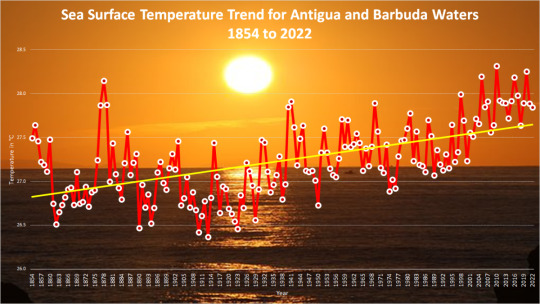
View On WordPress
0 notes
Text
Ocean temperatures are off the charts right now, and scientists are alarmed - CNN
20 notes
·
View notes
Text

Confirmed: Summer 2023 Hottest in NASA’s Record
All three months of summer 2023 broke records. July 2023 was the hottest month ever recorded, and the hottest July. June 2023 was the hottest June, and August 2023 was the hottest August.
NASA’s temperature record, GISTEMP, starts in 1880, when consistent, modern recordkeeping became possible. Our record uses millions of measurements of surface temperature from weather stations, ships and ocean buoys, and Antarctic research stations. Other agencies and organizations who keep similar global temperature records find the same pattern of long-term warming.
Global temperatures are rising from increased emissions of greenhouse gasses, like carbon dioxide and methane. Over the last 200 years, humans have raised atmospheric CO2 by nearly 50%, primarily through the burning of fossil fuels.
Drivers of climate change, both natural and human-caused, leave distinct fingerprints. Through observations and modeling, NASA researchers confirm that the current warming is the result of human activities, particularly increased greenhouse gas emissions.
6K notes
·
View notes
Text
Some alarming climate news as of June 2023
Antarctica, which is in the dead of winter, has unexpectedly failed to reform its winter sea ice. This is an exceptional deviation from the norm that has left scientists dumbfounded.
The entire NE Atlantic Ocean is experiencing its most significant marine heatwave ever…by far. That area had never been a full 1°C above the 1951-1980 average. It has suddenly jumped to 1.7°C above that average.
A powerful heatwave has overtaken southern North America for weeks on end, with places like Texas and northern Mexico breaking daily record high temperatures.
In the Caribbean Sea and Gulf of Mexico, sea surface temperatures are extremely high. Water temperatures are in the *90s* by the Florida coast, Miami keeps breaking daily record heat index values, and a major coral bleaching event will soon be underway.
The Canadian 2023 Wildfire Season will not let up, with nearly all annual records falling before we even reach the midpoint of the season. No Canadian wildfire season had ever produced 12 terawatts (TW) of fire radiative power. 2023 has produced 18TW.
Dramatic flood events have begun striking various countries around the world simultaneously this week.
El Niño has rapidly developed in recent months as sea surface temperatures across the equatorial east Pacific skyrocket. As of yet, El Niño has not impacted global weather conditions. That will change in a few months.
All of these events have culminated in June 2023, easily being the hottest June in Earth’s recorded history. Likely the hottest June in 115k-120k years when Earth was last this hot.
#important#current events#news#environment#climate#climate change#climate justice#environmentalism#environmental justice#global warming#activism#climate crisis#climate news
4K notes
·
View notes
Text
Kelly and Zach Weinersmith’s “A City On Mars”
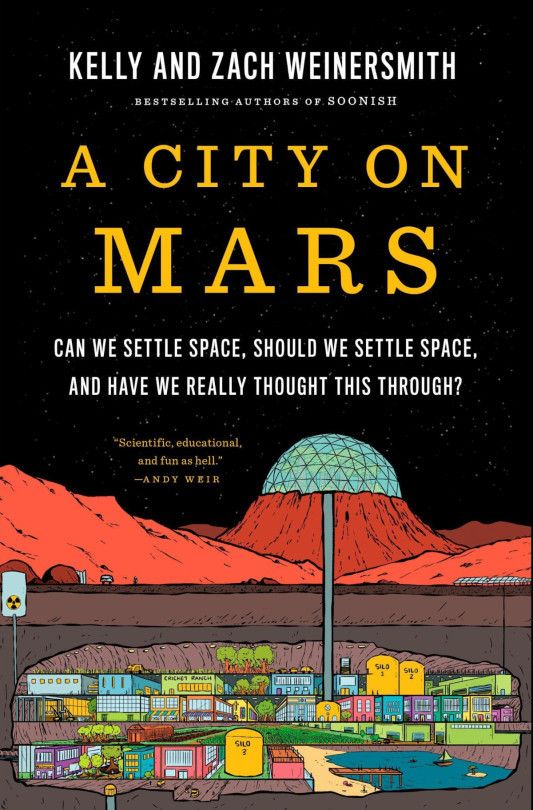
In A City On Mars, biologist Kelly Weinersmith and cartoonist Zach Weinersmith set out to investigate the governance challenges of the impending space settlements they were told were just over the horizon. Instead, they discovered that humans aren't going to be settling space for a very long time, and so they wrote a book about that instead:
https://www.acityonmars.com/
The Weinersmiths make the (convincing) case that ever aspect of space settlement is vastly beyond our current or reasonably foreseeable technical capability. What's more, every argument in favor of pursuing space settlement is errant nonsense. And finally: all the energy we are putting into space settlement actually holds back real space science, which offers numerous benefits to our species and planet (and is just darned cool).
Every place we might settle in space – giant rotating rings, the Moon, Mars – is vastly more hostile than Earth. Not just more hostile than Earth as it stands today – the most degraded, climate-wracked, nuke-blasted Earth you can imagine is a paradise of habitability compared to anything else. Mars is covered in poison and the sky disappears under planet-sized storms that go on and on. The Moon is covered in black-lung-causing, razor-sharp, electrostatically charged dust. Everything is radioactive. There's virtually no water. There are temperature swings of hundreds of degrees every couple of hours or weeks. You're completely out of range of resupply, emergency help, or, you know, air.
There's Helium 3 on the Moon, but not much of it, and there is no universe in which is it cheaper to mine for Helium 3 on the Moon than it is to mine for it on Earth. That's generally true of anything we might bring back from space, up to and including continent-sized chunks of asteroid platinum.
Going to space doesn't end war. The countries that have gone to space are among the most militarily belligerent in human history. The people who've been to space have come back perfectly prepared to wage war.
Going to space won't save us from the climate emergency. The unimaginably vast trove of material and the energy and advanced technology needed to lift it off Earth and get it to Mars is orders of magnitude more material and energy than we would need to resolve the actual climate emergency here.
We aren't anywhere near being a "multiplanetary species." The number of humans you need in a colony to establish a new population is hard to estimate, but it's very large. Larger than we can foreseeably establish on the Moon, on Mars, or on a space-station. But even if we could establish such a colony, there's little evidence that it could sustain itself – not only are we a very, very long way off from such a population being able to satisfy its material needs off-planet, but we have little reason to believe that children could gestate, be born, and grow to adulthood off-planet.
To top it all off, there's space law – the inciting subject matter for this excellent book. There's a lot of space law, and while there are some areas of ambiguity, the claims of would-be space entrepreneurs about how their plans are permissible under the settled parts of space law don't hold up. But those claims are robust compared to claims that space law will simply sublimate into its constituent molecules when exposed to the reality of space travel, space settlement, and (most importantly) space extraction.
Space law doesn't exist in a vacuum (rimshot). It is parallel to – and shares history with – laws regarding Antarctica, the ocean's surface, and the ocean's floor. These laws relate to territories that are both vastly easier to access and far more densely populated by valuable natural resources. The fact that they remain operative in the face of economic imperatives demands that space settlement advocates offer a more convincing account than "money talks, bullshit walks, space law is toast the minute we land on a $14 quadrillion platinum asteroid."
The Weinersmiths have such an account in defense of space law: namely, that space law, and its terrestrial analogs, constitute a durable means of resolving conflicts that would otherwise give rise to outcomes that are far worse for science, entrepreneurship, human thriving or nation-building than the impediments these laws represent.
What's more, space law is enforceable. Not only would any space settlement be terribly, urgently dependent on support from Earth for the long-foreseeable future, but every asteroid miner, Lunar He3 exporter and Martian potato-farmer hoping to monetize their products would have an enforcement nexus with a terrestrial nation and thus the courts of that nation.
But the Weinersmiths aren't anti-space. They aren't even anti-space-settlement. Rather, they argue that the path to space-based scientific breakthroughs, exploration of our solar system, and a deeper understanding of our moral standing in a vast universe cannot start with space settlements.
Landing people on the Moon or Mars any time soon is a stunt – a very, very expensive stunt. These boondoggles aren't just terribly risky (though they are – people who attempt space settlement are very likely to die horribly and after not very long), they come with price-tags that would pay for meaningful space science. For the price of a crewed return trip to Mars, you could put multiple robots onto every significant object in our solar system, and pilot an appreciable fleet of these robot explorers back to Earth with samples.
For the cost of a tiny, fraught, lethal Moon-base, we could create hundreds of experiments in creating efficient, long-term, closed biospheres for human life.
That's the crux of the Weinersmiths' argument: if you want to establish space settlements, you need to do a bunch of other stuff first, like figure out life-support, learn more about our celestial neighbors, and vastly improve our robotics. If you want to create stable space-settlements, you'll need to create robust governance systems – space law that you can count on, rather than space law that you plan on shoving out the airlock. If you want humans to reproduce in space – a necessary precondition for a space settlement that lasts more than a single human lifespan – then we need to do things like breed multiple generations of rodents and other animals, on space stations.
Space is amazing. Space science is amazing. Crewed scientific space missions are amazing. But space isn't amazing because it offers a "Plan B" for an Earth that is imperiled by humanity's recklessness. Space isn't amazing because it offers unparalleled material wealth, or unlimited energy, or a chance to live without laws or governance. It's not amazing because it will end war by mixing the sensawunda of the "Pale Blue Dot" with the lebensraum of an infinite universe.
A science-driven approach to space offers many dividends for our species and planet. If we can figure out how to extract resources as dispersed as Lunar He3 or asteroid ice, we'll have solved problems like extracting tons of gold from the ocean or conflict minerals from landfill sites, these being several orders of magnitude more resource-dense than space. If we can figure out how to create self-sustaining terraria for large human populations in the radiation-, heat- and cold-blasted environs of space, we will have learned vital things about our own planet's ecosystems. If we can build the robots that are necessary for supporting a space society, we will have learned how to build robots that take up the most dangerous and unpleasant tasks that human workers perform on Earth today.
In other words, it's not just that we should solve Earth's problems before attempting space settlement – it's that we can't settle space until we figure out the solutions to Earth's problems. Earth's problems are far simpler than the problems of space settlement.
As I read the Weinersmiths' critique of space settlement, I kept thinking of the pointless AI debates I keep getting dragged into. Arguments for space settlement that turn on existential risks (like humanity being wiped out by comets, sunspots, nuclear armageddon or climate collapse) sound an awful lot like the arguments about "AI safety" – the "risk" that the plausible sentence generator is on the verge of becoming conscious and turning us all into paperclips.
Both arguments are part of a sales-pitch for investment in commercial ventures that have no plausible commercial case, but whose backers are hoping to get rich anyway, and are (often) sincerely besotted with their own fantasies:
https://locusmag.com/2023/12/commentary-cory-doctorow-what-kind-of-bubble-is-ai/
Both AI and space settlement pass over the real risks, such as the climate consequences of their deployment, or the labor conditions associated with their production. After all, when you're heading off existential risk, you don't stop to worry about some carbon emissions or wage theft.
And critically, both ignore the useful (but resolutely noncommercial) ways that AI or space science can benefit our species. AI radiology analysis might be useful as an adjunct to human radiological analysis, but that is more expensive, not less. Space science might help us learn to use our materials more efficiently on Earth, and that will come long before anyone makes rendezvous with a $14 quadrillion platinum asteroid.
There are beneficial uses for LLMs. When the Human Rights Data Analysis Group uses an LLM to help the Innocence Project New Orleans extract and categorize officer information from wrongful conviction records, they are doing something valuable and important:
https://hrdag.org/tech-notes/large-language-models-IPNO.html
It's socially important work, a form of automation that is an unalloyed good, but you won't hear about it from LLM advocates. No one is gonna get rich on improving the efficiency of overturning wrongful convictions with natural language processing. You can't inflate a stock bubble with the Innocence Project.
By the same token, learning about improving gestational health by breeding multigenerational mouse families in geosynchronous orbit is no way to get a billionaire tech baron to commit $250 billion to space science. But that's not an argument against emphasizing real science that really benefits our whole species. It's an argument for taking away capital allocation authority from tech billionaires.
I'm a science fiction writer. I love stories about space. But I can distinguish fantasy from reality and thought experiments from suggestions. Kim Stanley Robinson's 2015 novel Aurora – about failed space settlement – is every bit as fascinating and inspirational as "golden age" sf:
https://memex.craphound.com/2015/11/02/kim-stanley-robinsons-aurora-space-is-bigger-than-you-think/
But still, it inspired howls of outrage from would-be space colonists. So much so that Stan wrote a brilliant essay explaining what we were all missing about space settlement, which I published:
https://boingboing.net/2015/11/16/our-generation-ships-will-sink.html
With City on Mars, the Weinersmiths aren't making the case for giving up on space, nor are they trying to strip space of its romance and excitement. They're trying to get us to focus on the beneficial, exciting, serious space science we can do right now, not just because it's attainable and useful – but because it is a necessary precondition for any actual space settlement in the distant future.

If you'd like an essay-formatted version of this post to read or share, here's a link to it on pluralistic.net, my surveillance-free, ad-free, tracker-free blog:
https://pluralistic.net/2024/01/09/astrobezzle/#send-robots-instead
#pluralistic#books#reviews#space#bezzles#mars#spacex#robots#science#space science#space travel#space settlement#space colonization
1K notes
·
View notes
Text
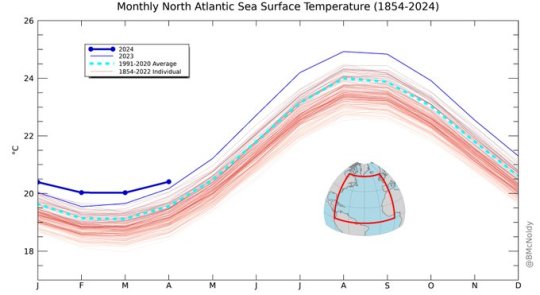
"The 14th consecutive month of record-breaking warm ocean temperatures in the North Atlantic is in the books… 📈🥵"
--- #BMcNoldy Senior Research Associate at the Univ. of Miami Rosenstiel School. Hurricanes, climatology, & sea level rise… mostly.
0 notes
Text
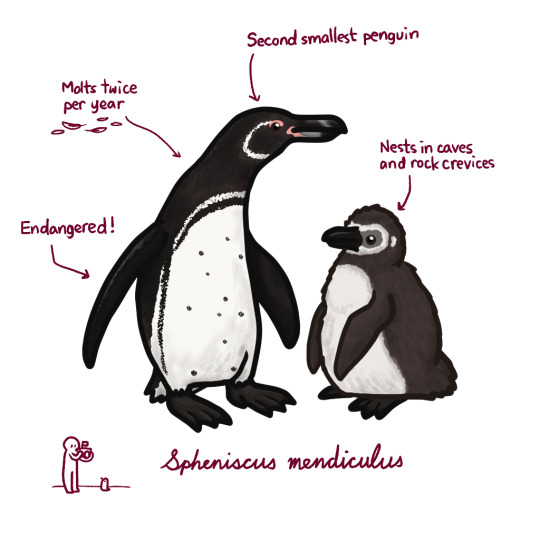
The Galápagos penguin is endemic to the Galápagos Islands and is the rarest penguin. Because they can't breed when ocean surface temperatures are above 25C, they're especially affected by climate change. Ecotourism is also a threat, due to littering and irresponsible birdwatching.
797 notes
·
View notes